UN nuclear chief to visit Iran on Wednesday after Trump’s victory
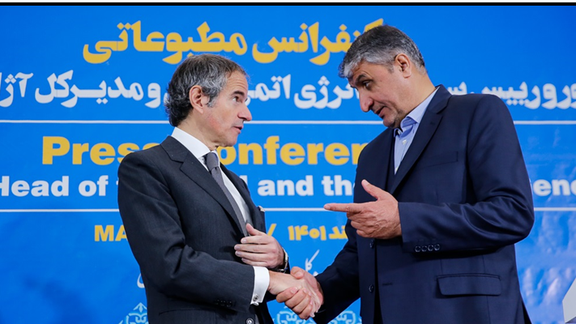
UN nuclear watchdog chief Rafael Grossi will visit Iran on Wednesday, with consultations with Iranian officials set to begin the following day, Iranian state media reported on Sunday.

UN nuclear watchdog chief Rafael Grossi will visit Iran on Wednesday, with consultations with Iranian officials set to begin the following day, Iranian state media reported on Sunday.
Grossi, the head of the International Atomic Energy Agency (IAEA), had indicated earlier in the week that he might soon visit Iran to address its contentious nuclear program and expressed hope for cooperative engagement with US President-elect Donald Trump.
Iran began high degree of uranium enrichment in 2021, three years after Trump left the 2015 JCPOA nuclear deal and imposed economic sanctions on the Islamic Republic. With more than 110 kilos of enriched uranium, Iran is now considered a nuclear threshold state.
Key issues between Iran, the IAEA, and Western powers include Tehran’s exclusion of uranium-enrichment experts from IAEA inspection teams and its longstanding failure to clarify the presence of uranium traces at undeclared locations.
The 2015 nuclear deal aimed to prevent Iran from advancing its nuclear capabilities, which Western nations viewed as a potential path toward nuclear weapons. With the high degree of uranium enrichment, the IAEA believes that Tehran would need just 2-3 weeks to amass enough uranium enriched to 90% purity for a nuclear bomb.
Iran is now enriching uranium up to 60% purity—close to the 90% level required for a nuclear weapon. The IAEA estimates that, if further enriched, Iran has accumulated enough uranium to produce about four nuclear bombs.
Iran maintains that it has no intentions of developing nuclear weapons and insists its uranium enrichment is solely for civilian energy purposes. However, uranium enriched to 60% purity has no known civilian use.
President-elect Donald Trump has repeatedly stated in recent months that he will not permit Iran to acquire nuclear weapons. His new administration is likely to impose additional sanctions and ramp up enforcement of existing ones. After six years of US sanctions that have severely impacted Iran's economy, Grossi’s visit could present an opportunity for Iranian concessions, including easing restrictions on the IAEA’s monitoring activities.
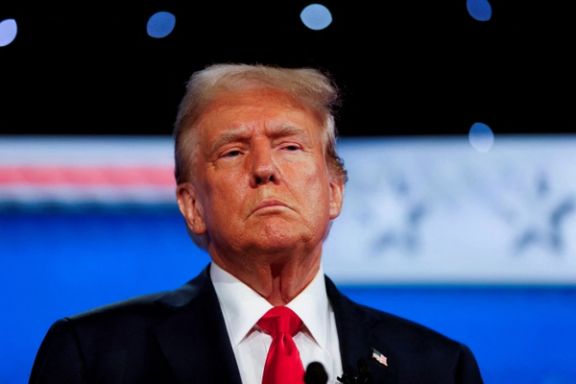
After initially downplaying the significance of Trump’s election on Iran, Tehran’s state-controlled media has shifted focus, now emphasizing the importance of lifting US sanctions for the country’s well-being.
Immediately after Donald Trump’s election, Iranian officials and media sought to downplay its significance, while markets in Iran reacted negatively, anticipating a tougher US policy than under the Biden administration. However, this public stance now appears to be shifting.
The most notable call for efforts to lift sanctions came from former parliament speaker Ali Larijani in an interview with Khabar Online on Saturday. The seasoned Islamic Republic politician voiced serious concern over next year’s budget deficit, projected to exceed 30 percent and amounting to over $30 billion.
Larijani expressed dismay at the large budget deficit and emphasized that the only solution is a significant improvement in the economy. Although Iran always had deficits, but this year’s picture is worse than ever, he stressed. The only solution is to lift sanctions, he emphasized.
"These sanctions have become a barrier to our development. I’m not saying that removing them will solve everything, but it’s like a large stone has fallen into a stream. You need to remove that stone to allow the economy to flow smoothly. So, I believe we must make an effort to resolve this issue,” the former Speaker said.
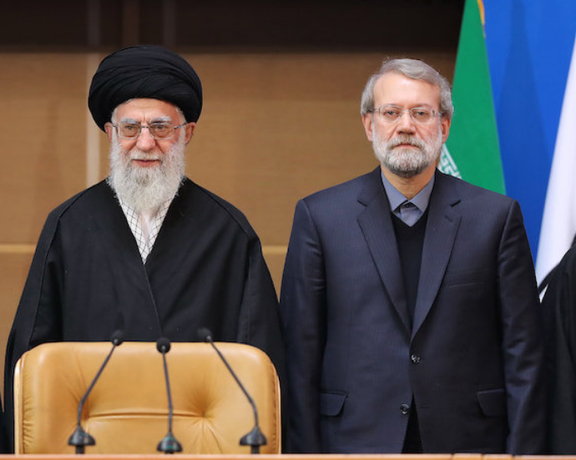
So far, after six years of economic crisis, a year of conflict between Israel and Iran’s regional proxies, and Donald Trump’s return to the presidency, Supreme Leader Ali Khamenei has remained silent, giving no indication of whether he is open to major concessions. During Trump’s first term, he demanded that Iran halt its nuclear program, scale back missile development, and cease support for militant groups like Hezbollah and Hamas.
The new president has yet to clarify his policy toward the Islamic Republic, but most observers agree he is likely to adopt a tough stance once again. Meanwhile, ordinary Iranians, struggling with over 40% annual inflation, are increasingly eager for the government to show flexibility.
University professor Mehdi Motaharnia told a conservative website on Saturday that Donald Trump has returned to power stronger than ever, now supported by a Republican-majority Congress. While Trump emphasized his aversion to further conflicts during his campaign, Motaharnia noted that he is expected to take a tough stance on Iran.
"Regarding Iran, we will see an increase in tensions and sanctions. Trump will apply maximum pressure on Iran in an effort to push Tehran towards a new agreement. Trump believes in direct negotiations with Iran; he is even willing to personally engage with certain individuals in Iran,” Motaharnia argued. He added that while Trump is generally open to negotiations, the conditions he will set for Iran are likely to be stringent.
Mahmoud Jamsaz, a prominent academic and economist, emphasized that US political developments affect not only Iran but the entire world. Jamsaz, who has frequently spoken openly about the government’s misguided policies, argued that Iran is currently facing too many economic challenges to afford indifference to Trump’s election.
"In May 2018, when Mr. Trump withdrew from the JCPOA, the country’s inflation sharply increased and has continued to rise ever since. Such conditions have had severely damaging effects on Iran’s economy,” Jamsaz said.
Within Iran’s restricted space of public discourse, the economist tried his best to sound a warning. "Trump has said he doesn’t have much interest in dealing with Iran, stating only that he will not allow Iran to acquire nuclear weapons. This is where the issue depends on Iran’s policies. If Iran shows some flexibility and, for example, the JCPOA is somehow revived, we would see a positive economic impact. But if we move in a direction other than flexibility, conditions will naturally become more difficult."
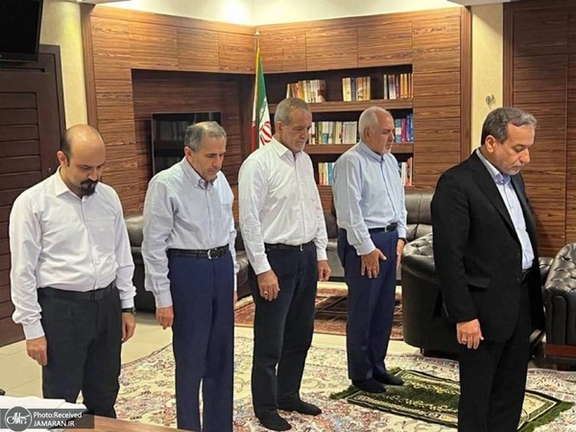
Iran's foreign minister on Saturday dismissed allegations about Iran's involvement in a plot to assassinate US President-elect Donald Trump, calling it a fabricated scenario.
The US Justice Department on Friday unsealed murder-for-hire charges against an Afghan national named Farhad Shakeri, 51, who it said was tasked by Iran’s Islamic Revolutionary Guard Corps with assassinating Trump. Shakeri now lives in Iran, according to the indictment.
In a post on his X account, Iran's Foreign Minister Abbas Araghchi said the accusation is part of a scenario, and that no one "in their right mind believes that a supposed assassin sits in Iran and talks online to the FBI."
Earlier in the day, Iran's Foreign Ministry spokesman had denied the Justice Department's accusation, calling it completely baseless and unacceptable.
The Islamic Republic's denial of any engagement in plots to assassinate Trump comes as its authorities have publicly vowed to kill Trump, his former foreign secretary Mike Pompeo and some other US officials in retaliation for the killing of Soleimani.
In one of the most recent cases, the IRGC Aerospace commander made the promise in a televised interview in February 2023, saying: "Inshallah (God willing) we will be able to kill Donald Trump, Mike Pompeo, (former CENTCOM chief Kenneth) McKenzie, and others who ordered killing of Qasem Soleimani."
Iran calls for mutual respect
In his Saturday statement, the Iranian foreign ministry spokesman said the allegations are part of "a repulsive conspiracy by Zionist (Israeli) and anti-Iranian circles aimed at further complicating issues between the United States and Iran."
But he was not the only official who expressed concern about Tehran's relations with the incoming Trump administration. The foreign minister, Araghchi, also tried to offer an olive branch to the president-elect, who in 2020 ordered the assassination of former IRGC Quds Force commander, Qassem Soleimani, and imposed toughest sanctions on Iran as part of his so-called "maximum pressure" policy.
"The American people have made their decision. And Iran respects their right to elect the President of their choice. The path forward is also a choice. It begins with respect," Araghchi said in his Saturday tweet.
He added that "Iran is NOT after nuclear weapons, period. This is a policy based on Islamic teachings and our security calculations. Confidence-building is needed from both sides. It is not a one-way street."

Elon Musk, the American billionaire and close ally of President-elect Donald Trump in the 2024 US president elections, has praised "talented Iranians" who have immigrated to America, amid concerns over the incoming administration’s potential tougher stance on immigration.
"America has benefited from an influx of very talented Iranians," Elon Musk said in a Saturday post on X, the platform he acquired for $44 billion in October 2022.
He made the remarks in reply to a personal story shared by Farzad Mesbahi, an X user born to Iranian immigrants who recounted the challenges his family faced after moving to the US and reflected on his evolving perspective on the future during the Trump era.
Exiled Iranian crown prince, Reza Pahlavi, confirmed Musk's statement, saying "Iranians have built some of America’s greatest companies."
"They can also play a transformational role in their home country by helping rebuild a prosperous Iran after the fall of the Islamic Republic. That new Iran will benefit its people, America, and the world," the prince said in a post on his X account.
Musk's praise of Iranian immigrants comes amid increasing uncertainty about the incoming Trump administration's measures against immigrants.
Trump made immigration a central focus of his campaign, pledging to establish what he terms "unprecedented order" at the southern border and initiate the largest mass deportation of undocumented immigrants in the nation’s history on his first day in office.
During his campaign, Trump labeled immigration as a crisis and pledged to act quickly to enforce a range of controversial policies aimed at cracking down on illegal immigration and limiting new arrivals.
“We are going to fix our borders. … We want people to come back in, but... they have to come in legally,” Trump said during his victory speech in Florida on Tuesday.
Back in March 2017, Trump signed the Executive Order 13780, better known as the Muslim Ban, which imposed restrictions on the travel of people from six majority-Muslim countries including Iran. The travel ban set off mass confusion at airports and even the agencies in charge of implementing it, as they did not know how the order will affect US green card holders and people who hold dual citizenship.
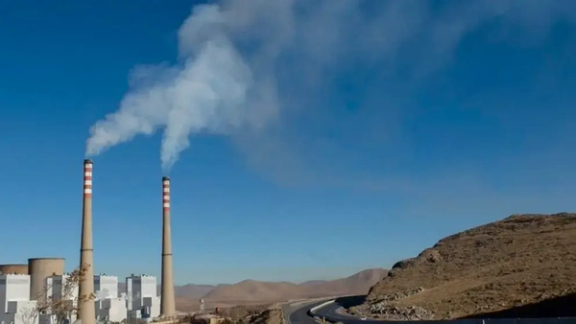
Tehran media carried headlines on Saturday that Iran is set to announce a nationwide blackout schedule, with power cuts planned from 9 a.m. to 5 p.m. starting Sunday, due to fuel shortages.
As winter nears, Iran faces an escalating energy crisis that has forced the government into tough decisions. After enduring summer blackouts from surging electricity demand, Iran now faces a natural gas shortage that could disrupt winter power supplies. With dwindling options, the administration has outlined a controversial plan to either impose blackouts or turn to mazut, a high-pollution fuel source that risks further air pollution.
The government issued a directive on November 3 to halt mazut burning at major plants in Arak, Karaj, and Isfahan, hoping to reduce health hazards in densely populated areas. Yet, with mazut still being used in other parts of the country, concerns persist about air quality and its impact on public health.
Economic pressures on Iran’s industry
The energy shortages have placed Iran’s industrial sector under strain, as frequent blackouts disrupt production and increase costs. In August, the government diverted electricity from industrial clients to meet household needs, causing substantial losses in sectors such as automotive and cement manufacturing. According to Saber Parnian, head of the Industry, Mining, and Trade Organization in West Azarbaijan, frequent power cuts have doubled production costs for cement, while MP Mansour Alimardani described the blackouts as devastating for job stability and business operations.
With cold weather driving up household energy demands, Iranian industries are again feeling the pinch. Gas restrictions this year began earlier than usual, leaving sectors like cement production struggling to maintain output as costs rise.
Environmental and health costs of mazut use
Reliance on mazut has raised alarm among environmental and health experts, given its high levels of sulfur, which are well above global standards for fuel oils. Environmental expert Masoud Tajrishi highlighted the risks in an interview with Rouydad24 website, adding that “Mazut retains hazardous elements from crude oil. When burned, it increases particulate matter, leading to respiratory problems and severe health risks.”
Although Iran’s ministry of energy has expressed concerns over mazut’s environmental effects, it faces limited options as gas supplies continue to fall short of demand.
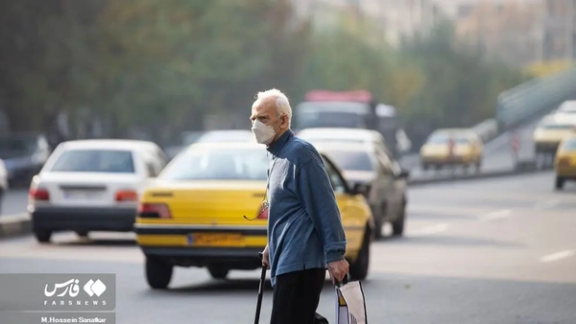
Reliance on Turkmen gas imports
Iran’s reliance on natural gas imports from Turkmenistan to support its northern regions has exacerbated the crisis. An unresolved debt dispute has blocked Turkmenistan from resuming gas exports, leading to fears that residents in northern provinces could be left without sufficient heating this winter.
During a recent cabinet meeting, President Pezeshkian acknowledged the financial hurdles in negotiating with Turkmenistan, noting that payment issues have hampered gas imports in previous winters as well.
Systemic failures and calls for reform
Energy analysts argue that Iran’s crisis stems from years of underinvestment and resource mismanagement. Energy expert Narsi Ghorban estimates that Iran’s infrastructure requires a $250 billion overhaul to meet its energy needs.
“Yet no progress has been made on this front,” Ghorban added, indicating little confidence in swift reforms.
Hashem Oraei, a university professor, in an interview with Aftab News warned that the energy sector’s challenges could leave Iran facing blackouts reminiscent of those in Cuba if solutions are not found.
"Nationwide blackouts like in Cuba and a return to the era of waiting in line for oil and burning wood are not just predictions but something inevitable," he said.
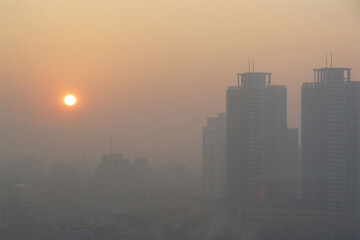
Tajrishi also stressed the need for systemic reforms, citing the Clean Air Act, which requires upgrades to energy systems to reduce consumption, particularly in regions at the end of the gas network. “Reducing household energy use by even 15% could stabilize supplies and lessen the need for mazut,” he said.
With planned blackouts set to begin, Iran’s energy crisis highlights a need for reform. Pezeshkian’s administration now faces mounting pressure to balance energy access with health and environmental concerns as winter approaches.
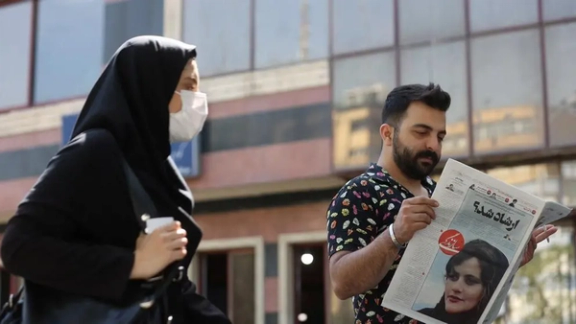
President Masoud Pezeshkian's government has intensified its crackdown on the press, with the Defending Free Flow of Information in Iran (DeFFI) reporting a wave of judicial and security measures impacting 78 journalists and media outlets in its first 100 days.
DeFFI, a non-profit organization dedicated to protecting media freedoms, noted that the government’s restrictions on information access have intensified during the Pezeshkian administration.
“In the first 100 days of Masoud Pezeshkian’s presidency, not only was there no significant change in the indicators of press freedom in Iran, but organized disruptions to free information continued, patterns of suppressing freedom of expression were expanded, and 78 media outlets and journalists experienced judicial and security confrontations by the Islamic Republic,” wrote DeFFI on Friday.
Established amid the Women, Life, Freedom protests in 2022, DeFFI was formed by journalists, lawyers, and human rights advocates to document media suppression and advocate for free expression.
The protests, which called for greater social freedoms and led to widespread unrest, triggered unprecedented levels of state repression targeting journalists and media outlets. This latest report suggests that despite the change in presidential administration, there has been little to no improvement in press freedom.
DeFFI’s report highlights that Pezeshkian’s term has seen a continuation of repressive tactics, with the number of imprisoned journalists increasing from eight to ten during the administration’s first 100 days. Temporary detentions were also prevalent, affecting journalists such as Fatemeh Gholipour, Fardin Mostafaei, Ajdar Piri, and Reza Valizadeh between July and November.
According to DeFFI, Pezeshkian’s administration has presided over a sharp escalation in legal actions against the press. From late July through early November, political and press courts issued criminal charges in 32 documented cases, resulting in prison sentences, corporal punishment, and fines. Seven journalists, including Niloufar Hamedi and Elahe Mohammadi, received a cumulative sentence totaling over 13 years in prison, 70 lashes, and substantial fines.
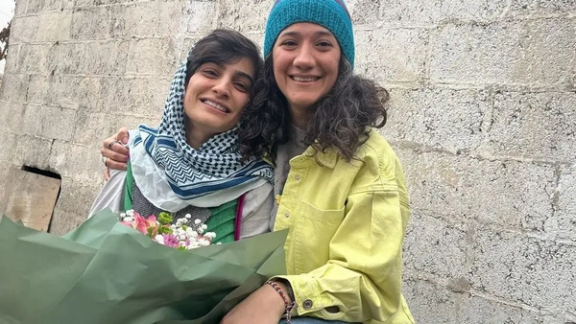
Hamedi and Mohammadi are recognized for their reporting on the death of Mahsa Amini in September 2022. Their work brought international attention to the incident, leading to widespread protests in Iran. In September 2022, shortly after their coverage of Amini's death, both journalists were arrested. They faced charges including "collaborating with the hostile US government," "acting against national security," and "propaganda against the system." In October 2023, the Tehran Revolutionary Court sentenced Hamedi to seven years and Mohammadi to six years in prison.
The DeFFI data reflects that September was a particularly fraught month for press freedoms, with judicial and security confrontations against journalists increasing by 30% from August. In September, DeFFI documented that at least 24 journalists and media entities faced government confrontations in 28 separate cases, underscoring a pattern of intensified pressure on those reporting critically on state matters.
DeFFI’s findings also reveal a rise in legal complaints against media professionals since Pezeshkian took office. During this period, at least 38 new complaints were filed, with government entities accounting for more than half. Prominent complainants included the Tehran Prosecutor’s Office, Cyber Police, and several high-profile ministries, including those of Oil, Culture, and Economy. While Pezeshkian previously committed to withdrawing government-led complaints against journalists, the report notes that officials not only failed to retract cases but filed numerous new complaints.
In addition to increased judicial actions, the report describes ongoing violations of journalists’ rights during investigations. Between July and November, there were 74 documented instances of rights violations, with unauthorized or non-transparent trials occurring in 46 cases. DeFFI reported other violations, including interference in journalistic activities, arbitrary detentions, denial of legal representation, and seizure of personal property. Physical assaults on journalists were also reported, with two instances of documented physical abuse by security forces.
Since its establishment, the Islamic Republic has consistently suppressed independent media through arrests, torture, and imprisonment.
While Pezeshkian’s government initially suggested it would support freer expression, DeFFI’s findings suggest otherwise, pointing to an entrenched pattern of media suppression.